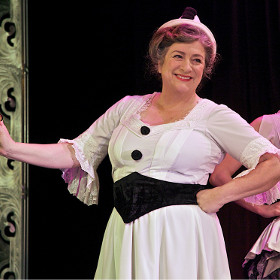Michael Coveney: Fringe benefits of Chris Malcolm and Snoo Wilson
Our chief critic reflects on the passing of two significant figures in London’s fringe theatre scene
Father Time has been picking off a few early pioneers of the fringe, most poignantly, perhaps, the actor and producer Chris Malcolm, who died on Saturday morning aged 67 after a long illness. No-one knew, least of all me, that he was the West End producer behind last week's terrific revival of Oh What a Lovely War at Stratford East, and his daughter, playwright Morgan Lloyd Malcolm, tells me that at least he died happy at home having read the good reviews.
Chris, the original Brad Majors in The Rocky Horror Show, and the co-producer worldwide of all Rocky Horror major revivals and tours since 1990, had noted the upcoming anniversary of Lovely War a couple of years ago and worked with Kerry Michael at Stratford East in putting together both the production team, led by director Terry Johnson, and the casting.

© Francis Loney
Even though Caroline Quentin is booked for the West End revival (from Chichester) of Noel Coward's Relative Values directed by Trevor Nunn – the display ads suggest that this slight comedy is a cousin of 'Downton Abbey'' – and even though she is outstanding in Johnson's hand-picked ensemble, she should be replaceable if the show does indeed transfer.
Very much a link between the fringe and the commercial sector, Chris was a member of the RSC in the early Trevor Nunn years and worked at the Royal Court in plays by Michael Weller and Sam Shepard as well as Rocky Horror, which came from left field, moved up the King's Road to a converted cinema and became a cult classic, mainly through the film (which he wasn't part of). He always maintained a career as an actor, but was producing from the late 1970s, often in conjunction with the Half Moon, the King's Head or the ICA, as well as Stratford East.
His early shows included the marvellous Pal Joey with Sian Phillips and Denis Lawson, Nell Dunn's radically feminist Steaming, Julie Walters in Frankie and Johnny in the Claire de Lune, and five of the best of Berkoff, including Tim Roth in Metamorphosis, Sink the Belgrano (in response to the Falklands War), Decadence and Greek, those last two incongruously presented at the gloriously luxuriant Wyndham's Theatre.
One of his countless friends and colleagues across several decades was Simon Callow. He guided the National's Alan Bennett double bill of Single Spies (Simon appeared in one, directed the other) for a year's run at the Queen's in 1989 and, ten years later, co-produced Callow's rather underrated revival of The Pajama Game at the Birmingham Rep and then at the Victoria Palace.
Callow will be memorialising an even closer friend and colleague, Snoo Wilson, at 6pm on Friday this week at the National (on the set of Blurred Lines in The Shed), when he takes part in an NT Platform, The Writing of Snoo Wilson, alongside Howard Brenton, actor Clive Merrison, former Bush director Dusty Hughes, NT Connections director Liz Dale and myself; oodles and snoodles of funny stories coming up, no doubt.
Whereas Chris Malcolm found accommodation for his talents in the commercial sector, Snoo, who died suddenly of a heart attack last year, and whom I once described as the alternative absurdist, was a genuine maverick and intellectual outsider who found it hard enough to be accepted at the Royal Court, let alone the West End.
Nonetheless, he had a brilliant career, starting out in Hare and Brenton's Portable Theatre touring company at the end of the 1960s, blasting through with visceral, fervidly imaginative plays called Pignight, Blowjob and Vampire (the latter a trilogy embracing vampirism, Victorian melodrama and the suffragette movement, with Enoch Powell rising from a coffin to deliver a speech about English cities becoming alien territories).
Quite a lot of the fringe, even back then, quickly became timidly imitative of mainstream theatre, and it's rare today to find daring experiments in form and language in our attics and cellars; the fringe mantra is usually in praise of intimacy with actors or the detail of naturalism, as if it were television in 3D.
Snoo, on the other hand, was the kind of writer for whom the fringe was originally intended, totally wild and unpredictable, brilliantly optimistic about what could be packed into 90 minutes in a small room with the idea only of bursting free. And only Tom Stoppard could possibly rival him in brain-power, or range of historical and cultural subject matter.
A play about the occult satanist Aleister Crowley, The Beast, led to a fruitful period as the RSC's dramaturge in the 1970s, and his first major Royal Court play, The Glad Hand (1978), featured an exhilarating pursuit of the Anti-Christ through the Bermuda Triangle during the cowboy strike of 1886; Max Stafford-Clark's production was a corker, but it still emptied the place.
Surprisingly, in 1994, he wrote a comedy of royal manners, HRH, a two-hander for the abdicating monarch, the Duke of Windsor, and Wallis Simpson. Despite some delightful quips about Mrs Simpson's alleged sexual proclivities, and some cheeky parallels drawn between her and the recently deceased Princess Diana, the play was not a West End success; Snoo belonged to the fringe, and the Bush Theatre in particular, and it's only a shame that even his own constituency didn't always recognise his great and inimitable talent.
See Also: Michael Coveney – Tales of Bob and Snoo Wilson at the Manchester International Festival












